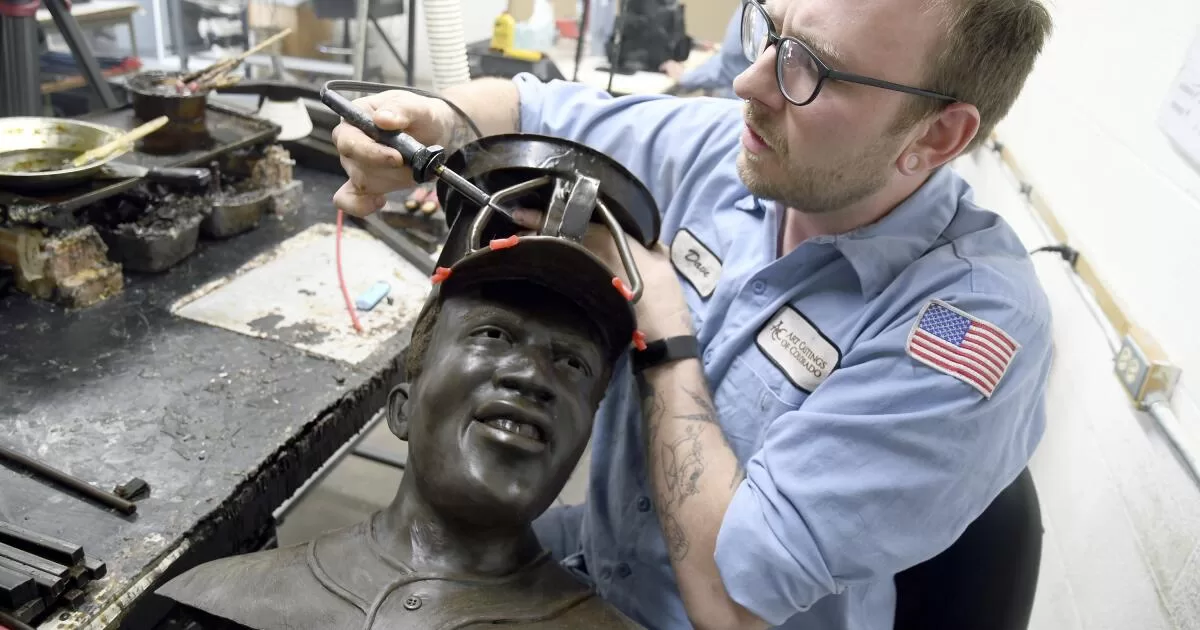“Many sculptures come through here,” Haines said at the Art Castings of Colorado studio in Loveland, Colo., where the original statue was cast. “Some are a little bit more important than others. And this is definitely one of them.”
It all started in January, when thieves cut the original statue off at its ankles, leaving only Robinson’s cleats behind at McAdams Park in Wichita. About 600 children play there in a youth baseball league called League 42. It is named after Robinson’s uniform number with the Brooklyn Dodgers, with whom he broke the major league’s color barrier in 1947.
The news spread wide, and a national outpouring of donations followed that enabled Wichita to quickly reorder a replacement.
“There’s been a lot of serendipity when it comes to League 42 throughout our entire existence,” said Bob Lutz, executive director of the Little League nonprofit that commissioned the statue. “It’s almost like there’s somebody watching out for us. And certainly, in this regard, we feel like … there was a guardian angel making sure that we could do this statue again.”
As news spread of the theft, the nonprofit was flooded with an estimated $450,000 to $500,000 in donations. That includes a $100,000 gift from Major League Baseball, which will cover the statue’s $45,000 replacement cost and other improvements, including landscaping and adding decorative bollards that will keep people from driving too close to the statue.
The rest of the money raised will go toward enhancing some of the nonprofit’s programming and facilities. Last year, the group opened the Leslie Rudd Learning Center, which includes an indoor baseball facility and a learning lab. There might even be enough money to add artificial turf and more lighting, Lutz said.
Another blessing for Lutz is that the replacement will look exactly like the original, which was created by his friend, the artist John Parsons, before his death in 2022 at the age of 67. That is possible because the original mold was still viable.
“If that wasn’t the case, I don’t know that I would feel as good about all this as I do,” Lutz said.
It looked dire five days after the theft, when fire crews found burned remnants of the Wichita statue while responding to a trash can fire at another park about 7 miles away from the scene of the theft.
One man has pleaded guilty, and the investigation continues into a crime that police said was motivated not by racial animus but by plans to sell the bronze for scrap.
It was a stupid plan, said Tony Workman, owner of Art Castings of Colorado. The town where the business is located, about 50 miles north of Denver, is well known for its abundance of sculptors and artists.
“The problem is you can’t get a fire in a dumpster hot enough to melt metal,” Workman said. “All you’re gonna do is burn the sculpture. So you’re still going to be able to tell what it was.”
Beyond rebuilding the statue, the severed bronze cleats from the original statue found a new home last month at the Negro Leagues Baseball Museum in Kansas City, Mo.
It is a fitting location. Robinson played for the Kansas City Monarchs of the Negro Leagues before joining the Dodgers, paving the way for generations of Black American ballplayers. Robinson, who is not only a sports legend but a civil rights icon, died in 1972.
“The outpouring of support that folks have gotten as a result of this, it reminds us that light indeed does come out of darkness,” said Bob Kendrick, the president of the Negro Leagues Baseball Museum.
At the museum, the cleats are part of a display that includes a gunfire-riddled plaque that had been erected outside Robinson’s birthplace near Cairo, Ga.
“It renews our spirt and belief in people because sometimes people will do despicable things, and it makes you want to give up on people,” Kendrick said. “But you know you can’t give up on people, even though sometimes you want to.”
On a recent morning, Emilio Estevez, a financial services worker from Miami, stopped to look at the cleats. He described Robinson as an inspiration — both because of his athleticism and his ability to put up with jeers and other abuse while integrating the sport.
“We can all learn from that,” he said.
And the thieves couldn’t take that away, Estevez said.
“He’s still in all our minds. He’s still very present, like here in the museum, very prevalent,” he said.
Hollingsworth and Peipert write for the Associated Press and reported from Loveland and Mission, Kan., respectively.
